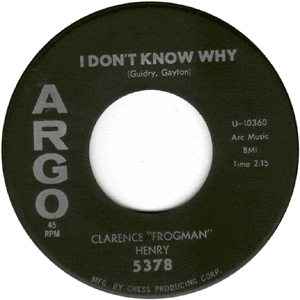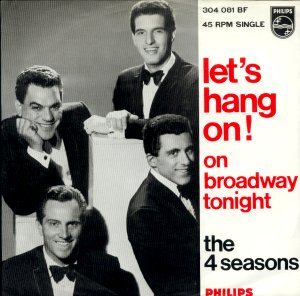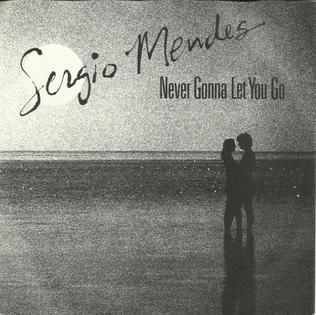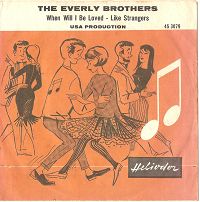
"Ooo Baby Baby" is a song written by Smokey Robinson and Pete Moore. It was a 1965 hit single by the Miracles for the Tamla (Motown) label.

"Billy Don't Be a Hero" is a 1974 pop song that was first a UK hit for Paper Lace and then, some months later, a US hit for Bo Donaldson and The Heywoods. The song was written and composed by two British songwriters, Mitch Murray and Peter Callander.

"Angel of the Morning" is a popular song written by Chip Taylor, originally recorded by Evie Sands but which first charted with a version by Merrilee Rush. The song has been covered by many artists including Chrissie Hynde, Dusty Springfield, P. P. Arnold, Connie Eaton, Mary Mason, Guys 'n' Dolls, Melba Montgomery, Olivia Newton-John and Juice Newton, who reached the Billboard Hot 100 top ten with her version in 1981.

"Hurts So Good" is a song by American singer-songwriter John Mellencamp, then performing under the stage name "John Cougar". The song was a number two hit on the Billboard Hot 100 for the singer/songwriter. It was the first of three major hit singles from his 1982 album American Fool. The others were "Jack & Diane" and "Hand to Hold on To," which were all released in 1982. The song was also a critical success with Mellencamp, winning the Best Rock Vocal Performance, Male at the 25th Grammy Awards on February 23, 1983.

"Signs" is the best known song by the Canadian rock group Five Man Electrical Band. It was written by the band's frontman, Les Emmerson, as he was traveling Route 66 while returning to Los Angeles from Canada and noticed all of the big signs and billboards obscuring his view of the natural scenery. The song popularized the relatively unknown band, who recorded it for their true first album, Good-byes and Butterflies, in 1970. Their actual first LP Five Man Electrical Band had begun as a Staccatos album with Brian Rading, the band's bassist suggesting the band's new name from the song title.

"Oh Girl" is a song written by Eugene Record and recorded by American soul vocal group the Chi-Lites, with Record on vocals and also producing. It was released as a single on Brunswick Records in 1972. Included on the group's 1972 album A Lonely Man, "Oh Girl" centers on a relationship on the verge of break-up.

"Soul Man" is a 1967 song written and composed by Isaac Hayes and David Porter, first successful as a number 2 hit single by Atlantic Records soul duo Sam & Dave, which consisted of Samuel "Sam" Moore and David "Dave" Prater. In 2019, "Soul Man" was selected for preservation in the National Recording Registry as "culturally, historically, and aesthetically significant" by the Library of Congress. It was No. 463 in "Top 500 Greatest Songs of All Time" by Rolling Stone in 2010 and No. 458 in 2004.

"(I Don't Know Why) But I Do" is an R&B song written by Paul Gayten and Bobby Charles, and performed by Clarence "Frogman" Henry.

"This Guy's in Love with You" is a hit song written by Burt Bacharach and Hal David and released by Herb Alpert in May, 1968. Although known primarily for his trumpet playing as the leader of the Tijuana Brass, Alpert sang lead vocals on this solo recording, which was arranged by Bacharach. An earlier recording of the song by British singer Danny Williams with different lyrics titled "That Guy's in Love" appeared on Williams' 1968 self-titled album.

"Hair" is the title song to the 1967 musical Hair and the 1979 film adaptation of the musical.

"Let's Hang On!" is a song composed by Bob Crewe, Sandy Linzer, and Denny Randell that was popularized by the Four Seasons in 1965.

"I'm Telling You Now" is a 1963 song by Freddie Garrity and Mitch Murray, originally performed by Freddie and the Dreamers, which, in 1965, reached number one on the American Billboard Hot 100.

"Never Gonna Let You Go" is a popular song from 1982, written by the husband-and-wife songwriting team of lyricist Cynthia Weil and composer Barry Mann. It was first recorded by Dionne Warwick for her 1982 album Friends in Love, and then by singer Stevie Woods for his 1982 album The Woman in My Life. The best known rendition, however, is sung by Joe Pizzulo and Leeza Miller on the 1983 self-titled album of Brazilian bandleader Sérgio Mendes.

"When Will I Be Loved" is a popular song written by Phil Everly of the Everly Brothers, who had a US top-ten hit with it in 1960. Linda Ronstadt covered the song in 1975, and her version was an even bigger hit in the US, peaking at No. 2. Vince Gill also covered it in 1994 on the soundtrack of the film 8 Seconds.

"Morning Side of the Mountain" is a song written by Larry Stock and Dick Manning and first recorded in 1951 by Tommy Edwards. It settled at #24 on the pop chart. Edwards re-recorded it in 1959, reaching #27 on the Billboard Hot 100. The re-release was featured as the B-side of Edwards' other hit, a cover of Johnnie Ray's 1952 success, "Please Mr. Sun."

"Take It Easy on Me" is a song by Australian soft rock band Little River Band, released in December 1981 as the second single from the album Time Exposure. The song reached No. 10 on the U.S. Billboard Hot 100, becoming their sixth and last top 10 hit on the chart and also reached No. 14 on the Adult Contemporary chart. The song was written by band member Graham Goble and produced by British record producer George Martin.

"The Things We Do for Love" is a song by British band 10cc, released as a single in 1976. It later featured on the album Deceptive Bends released in 1977 and was the group's first release after the departure of band members Kevin Godley and Lol Creme.

"Man on Your Mind" is a song by Australian rock band Little River Band. It was released in March 1982 as the third single from their sixth studio album, Time Exposure. "Man on Your Mind" peaked at No. 14 on the US Billboard Hot 100. The song is featured in the Sean Penn movie Bad Boys.

"Breakdown Dead Ahead" is a 1980 song recorded by Boz Scaggs, and composed by Scaggs and David Foster. It was the lead single of two released from Scaggs's album Middle Man.

"Soul Deep" is a song originally recorded by Robbie Lane and the Disciples in 1966, but best known by a recorded version by The Box Tops. It was the third of three singles released from their 1969 Dimensions LP. Lead vocals were provided by Alex Chilton.




















